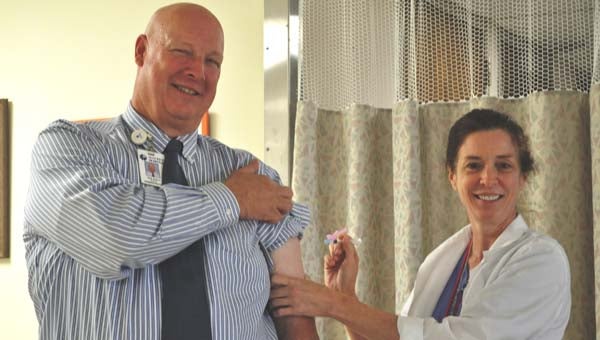Shoo flu! Protecting patients and employees of St. Luke’s Hospital
Published 10:00 pm Tuesday, January 6, 2015

Ken Shull, chief executive officer for St. Luke’s Hospital, gets a flu shot from Infection Preventionist Megan Parker, RN, and he says it didn’t hurt a bit!
The flu season has arrived, and St. Luke’s Hospital is urging residents who have not yet been vaccinated to get their flu vaccine. Like many area hospitals, St. Luke’s Hospital has experienced an increase in the number of those affected by the flu virus. During the month of December, lab tests confirmed 41 cases of Flu A.
With an increase in confirmed cases across the state as well as here locally, St. Luke’s Hospital is restricting visitation for people under the age of 18 and those who are experiencing flu-like symptoms including cough or fever.
“To protect our patients whose health is already compromised, we believe it’s best to ask others who don’t feel well to just stay home,” said Megan Parker, RN, infection preventionist at St. Luke’s Hospital. “We are also requiring employees who declined the flu vaccine to wear face masks when working within six feet of our patients.”
Trending
To date, 79 percent of St. Luke’s employees have received the flu vaccine and 15 percent signed a declination. Since October, more than 150 patients presented at the hospital with flu-like symptoms, which can often be confused with the common cold.
According to Hospitalist Thomas Dashiell, MD, the flu can often be much worse than the common cold.
“Colds will generally last a few days, while the flu can last much longer. Complications from colds are relatively minor, but seasonal flu can lead to pneumonia and hospitalizations. If you have symptoms of complication, it’s important to see your doctor.”
The common cold and flu are both contagious viral infections. Because these two types of illnesses have similar symptoms, it can be difficult to tell the difference between them based on symptoms alone. Nasal congestion, sore throat and sneezing are common with colds. Both colds and flu bring coughing, headache and chest discomfort. With the flu, though, a person is likely to run a high fever for several days and suffer with headache, body aches, fatigue and weakness.
Flu symptoms are usually more severe than cold symptoms and come on quickly. Symptoms of seasonal flu include sore throat, fever, headache, muscle aches and soreness, congestion and cough.
“Despite precautions, many people will catch a cold or the flu this year,” Dr. Dashiell said. “If you become ill, the most important thing to do is stay home and rest so that you get well and you don’t infect others. If you develop worsening of your condition or complications, it is important to seek additional medical attention.”
Trending
Dr. Dashiell stressed that the medications used to treat the flu are not curative but can lessen the severity of symptoms and decrease the duration of illness by about 24 hours.
St. Luke’s employees have been briefed about procedures regarding flu prevention according to CDC guidelines, Parker said. “We appreciate the understanding and cooperation of the community in keeping our patients and the staff who care for them as healthy as we can.”
“We have also posted notices throughout St. Luke’s with common sense steps all of us can take to avoid catching or spreading the flu,” adds Parker. “These include thorough hand washing with soap or alcohol-based hand cleaners, covering coughs and, if required or advised, to wear surgical face masks. So far these procedures have worked extremely well at limiting the spread of the flu at St. Luke’s, where we provide exceptional care, close to home.”
If you become ill with flu-like symptoms, Dr. Thomas Dashiell recommends the following:
- Stay home and avoid contact with other people, except to seek medical care.
- Take antiviral drugs if prescribed when symptoms first appear to shorten the duration of illness.
- Adults can use over-the-counter cold and flu medicines to get relief from fever and aches. Over-the-counter cough and cold medicines should not be given to children under 4. Contact your doctor for advice regarding treatment of children under the age of 4.
- Use decongestants and saline nasal sprays to open breathing passages to help you breathe.
- Keep your body hydrated by drinking plenty of fluids and juices. Avoid caffeinated drinks such as coffee, tea and colas that rob your body of fluids.
–Submitted by Kathy Woodham





